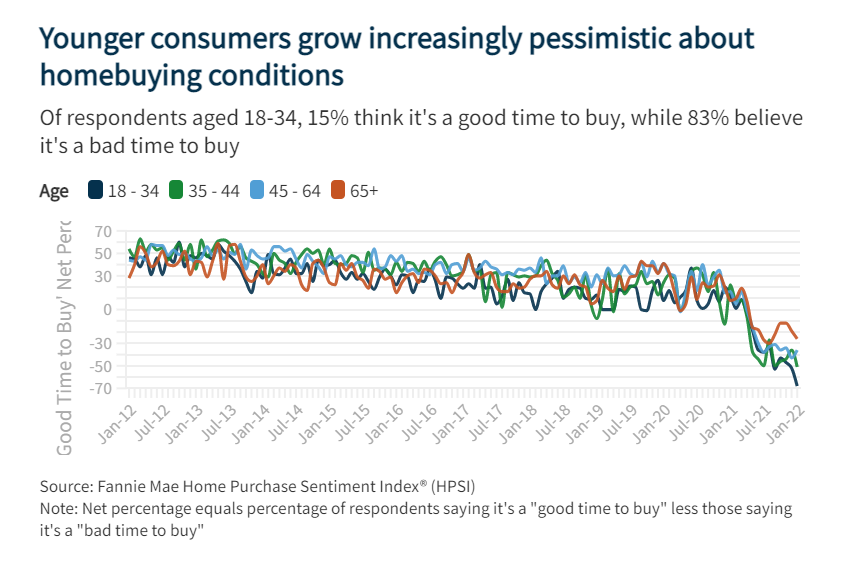 Reaching its lowest level since May 2020, the Fannie Mae Home Purchase Sentiment Index (HPSI) decreased 2.4 points to 71.8 in January, as affordability restrictions continue to weigh on the housing market. Overall, four of the index's six components decreased month-over-month, including components that measure consumers' perceptions of homebuying and home-selling conditions.
Reaching its lowest level since May 2020, the Fannie Mae Home Purchase Sentiment Index (HPSI) decreased 2.4 points to 71.8 in January, as affordability restrictions continue to weigh on the housing market. Overall, four of the index's six components decreased month-over-month, including components that measure consumers' perceptions of homebuying and home-selling conditions.
A record-low 25% of survey respondents in January reported that they believe it’s a good time to buy a home, compared to the 69% of consumers who reported now is the best time to sell. Consumers also reported more concerns surrounding job stability and the direction of mortgage rates. Year-over-year, the full index is down 5.9 points.
"Consumer sentiment toward housing softened further in January, as affordability and supply constraints continue to limit home purchase opportunities, particularly among younger households," said Doug Duncan, Fannie Mae Senior VP and Chief Economist. “On the whole, the latest HPSI results are consistent with our forecast of slowing housing activity in the coming year."

The percentage of respondents who say it’s a good time to buy decreased from 26% to 25%, while the percentage who say it is a bad time to buy increased from 66% to 70%. The net share of those who say it's the prime time to buy decreased 5 percentage points month-over-month.
The percentage of respondents who believe it is a good time to sell a home decreased from 76% to 69%, while the percentage who say it's a bad time to sell increased from 17% to 22%. As a result, the net share of those who say it’s a better time to sell decreased 12 percentage points.
Components of the HPSI such as home price and mortgage expectations, household income, and job concerns highlight the perception surrounding the current market. Some home purchase sentiment factors are:
- The percentage of respondents who say home prices will go up in the next 12 months decreased from 44% to 43%, while the percentage who say home prices will go down decreased from 19% to 14%. The share who expect home prices to remain the same increased from 30% to 35%.
- Respondents who say mortgage rates will go down in the next 12 months remained unchanged at 4%, while the percentage who expect mortgage rates to go up increased from 56% to 58%. The share of Americans who think mortgage rates will stay the same decreased from 30% to 28%.
- The percentage of respondents who are not concerned about losing their job in the next year decreased from 82% to 78%, while the percentage who say they are concerned increased from 16% to 17%.
- The percentage of respondents who say their household income is significantly higher than it was last year increased from 23% to 26%, while the percentage who believe their household income is significantly lower decreased from 17% to 14%. The percentage who perceive their household income to be about the same decreased from 59% to 56%.
“Younger consumers, more so than other groups, expect home prices to rise even further—and they also reported a greater sense of macroeconomic pessimism,” said Duncan. “Additionally, while the younger respondents are typically the most optimistic about their future finances, this month their sense of optimism around their personal financial situation declined. All of this points back to the current lack of affordable housing stock, as younger generations appear to be feeling it particularly acutely and, absent an uptick in supply, may have their homeownership aspirations delayed.”

 theMReport.com Your trusted source for mortgage banking news
theMReport.com Your trusted source for mortgage banking news








